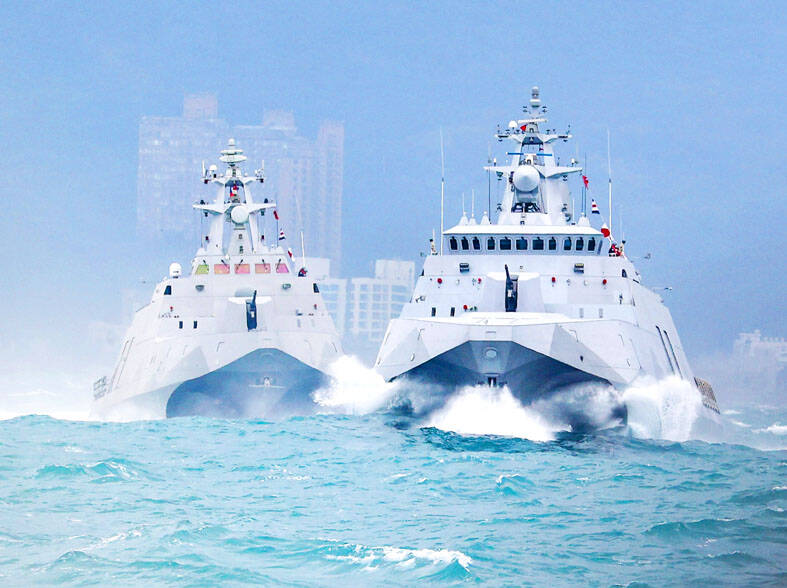The Ministry of National Defense on Wednesday awarded Lung Teh Shipbuilding (龍德造船) a NT$9.7 billion Co (US$317.57 million) contract to build five Tuo Chiang-class corvettes with anti-ship capabilities, a defense official familiar with the matter said yesterday.
The corvettes would carry vertical launchers for four Hsiung Feng II (HF-2) missiles, as well as eight Hsiung Feng III (HF-3) anti-ship missiles, in contrast to ships configured for anti-air warfare, which carry eight HF-2 and four HF-3 missiles, the official said, speaking on condition of anonymity.
The anti-ship corvettes would be armed for improved standoff range against surface combatants and carry the latest HF-2 variant, which has an enhanced range, larger maneuverability and updated electronic warfare technology, he said.

Photo: CNA
Lung Teh was chosen in large part because the shipbuilder had more experience than its competitors, he said.
It previously built the prototype for the Tuo Chiang-class and three anti-air corvettes, and has been tasked with building three more ships of that configuration, he said.
An anti-ship Tu Chiang-class corvette costs NT$7.56 billion when the platform, munitions, combat systems and logistics costs are included, while the program’s overall costs are projected at NT$37.8 billion, government reports showed.
A fleet of 12 Tou-Chiang class corvettes is planned, including the prototype, six anti-aircraft corvettes and five anti-ship corvettes, with the delivery of the last ship scheduled before the end of 2026.
Separately, a copy of the defense ministry’s latest budget proposal to the legislature confirmed that the navy’s submarine rescue ship program would receive NT$10.1 billion under a five-year force restructuring plan.
The move came a year after Democratic Progressive Party legislators Wang Ting-yu (王定宇) and Lin Shu-fen (林淑芬) joined independent Legislator Freddy Lim (林昶佐) in calling for the nation’s indigenous defense submarine program to have dedicated rescue capabilites.
A separate defense official familiar with the matter yesterday said that the budget would enable the navy to develop a defense submarine with deep-sea rescue capabilities, including an adjunct ship, crew and support facilities.
The defense submarine would come in addition to the first of a new class of 3,250-tonne rescue-and-salvage ships, which would enter service in September, the official said, speaking on condition of anonymity.
The new ship’s diving bell would be able to operate at depths of up to 100m and it would be equipped with a remotely operated vehicle that can dive up to 500m, they added.
Even though the ship would be operated by the navy, it would not be used for defense tasks.
The submarine’s rescue ship would have the same capabilities as vessels operated by the US Navy, but it is not yet clear whether it would be interoperable with the navies of the US and Japan, the official said, adding that the matter would have to be discussed with the US.

MAKING WAVES: China’s maritime militia could become a nontraditional threat in war, clogging up shipping lanes to prevent US or Japanese intervention, a report said About 1,900 Chinese ships flying flags of convenience and fishing vessels that participated in China’s military exercises around Taiwan last month and in January last year have been listed for monitoring, Coast Guard Administration (CGA) Deputy Director-General Hsieh Ching-chin (謝慶欽) said yesterday. Following amendments to the Commercial Port Act (商港法) and the Law of Ships (船舶法) last month, the CGA can designate possible berthing areas or deny ports of call for vessels suspected of loitering around areas where undersea cables can be accessed, Oceans Affairs Council Minister Kuan Bi-ling (管碧玲) said. The list of suspected ships, originally 300, had risen to about

DAREDEVIL: Honnold said it had always been a dream of his to climb Taipei 101, while a Netflix producer said the skyscraper was ‘a real icon of this country’ US climber Alex Honnold yesterday took on Taiwan’s tallest building, becoming the first person to scale Taipei 101 without a rope, harness or safety net. Hundreds of spectators gathered at the base of the 101-story skyscraper to watch Honnold, 40, embark on his daredevil feat, which was also broadcast live on Netflix. Dressed in a red T-shirt and yellow custom-made climbing shoes, Honnold swiftly moved up the southeast face of the glass and steel building. At one point, he stepped onto a platform midway up to wave down at fans and onlookers who were taking photos. People watching from inside

Japan’s strategic alliance with the US would collapse if Tokyo were to turn away from a conflict in Taiwan, Japanese Prime Minister Sanae Takaichi said yesterday, but distanced herself from previous comments that suggested a possible military response in such an event. Takaichi expressed her latest views on a nationally broadcast TV program late on Monday, where an opposition party leader criticized her for igniting tensions with China with the earlier remarks. Ties between Japan and China have sunk to the worst level in years after Takaichi said in November that a hypothetical Chinese attack on Taiwan could bring about a Japanese

The WHO ignored early COVID-19 warnings from Taiwan, US Deputy Secretary of Health and Human Services Jim O’Neill said on Friday, as part of justification for Washington withdrawing from the global health body. US Secretary of State Marco Rubio on Thursday said that the US was pulling out of the UN agency, as it failed to fulfill its responsibilities during the COVID-19 pandemic. The WHO “ignored early COVID warnings from Taiwan in 2019 by pretending Taiwan did not exist, O’Neill wrote on X on Friday, Taiwan time. “It ignored rigorous science and promoted lockdowns.” The US will “continue international coordination on infectious